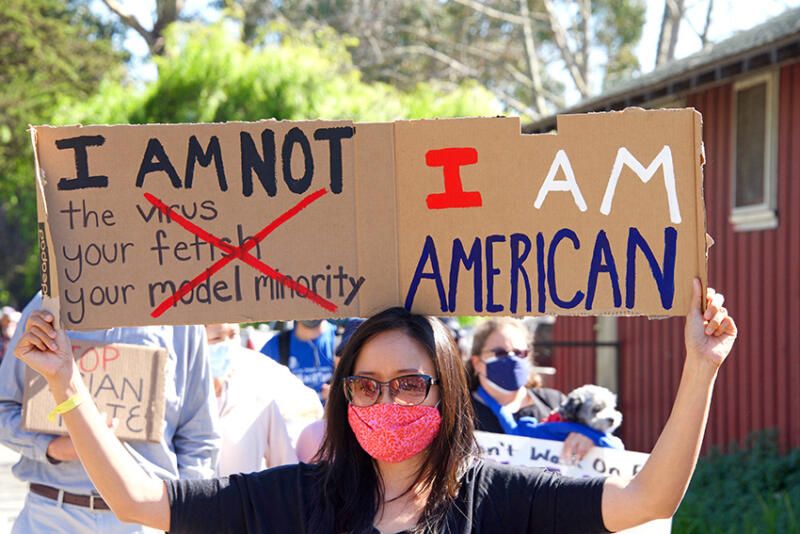Moving Beyond Hate: Asian American Women Respond to Uptick in Hate Attacks
(Ab0ve): Unidentified participants at Asian American Pacific Islander Youth Rising Rally marching from Aquatic Park to the pedestrian 80 freeway over pass. (Shutterstock/Siliconeer)
Since March 2020, the web portal Stop AAPI Hate has logged 10,370 reports of hate incidents, 16 of which have been physical violent attacks. Elderly Asian-American women have been especially vulnerable. Just in the last month two middle-aged women, one young woman and one more middle-aged women, both were killed in New York.
At an Ethnic Media Services briefing, held Feb. 25, panelists – Sung Yeon Choimorrow, Executive Director, National Asian Pacific American Women’s Forum; Marita Etcubanez, Senior Director of Strategic Initiatives, Asian Americans Advancing Justice; Michelle Kang, General Secretary of the Atlanta Korean Committee against Asian Hate; and Sasanna Yee, inspirational speaker and yoga teacher – discussed how communities have responded. A Siliconeer report.

Song Yeon Choimorrow provided a historic perspective as to how we got here and why women are such frequent targets of anti-Asian hate. “The rise in coverage of the murders and the violence against our community, particularly Asian American women, we must note that while the pandemic and the rhetoric of the former president blaming China and Chinese people for starting the virus and the pandemic may have dramatically increase the incidences of hate against AAPIs, it’s certainly not something new. As Asian American women, many of us felt living in the United States, long before COVID, and my personal experience – I came to the United States as an international student and there are a number of times I’ve been approached by men in social gathering spaces who sexually harassed me because of my race.”
“Objectification of Asian American women is nothing new and the pandemic has just exasperated this for many of us. Asian American women, in particular, experience increased harassment because we are targeted both for our race and our gender, as Stop AAPI Hate has reported,” said Choimorrow.
“In America, we see the rise of the demonization of Asian women as ‘dragon lady,’ as seen in a movie and on the other hand Asian women are also depicted as submissive and referred to as ‘geisha girl,’ ‘China doll’ and ‘lotus blossom.’ These are not favorable terms but rather a way to hyper-sexualize Asian women that makes American general public think that we’re easy targets for sexual and other forms of harassment.”
“In 1966, sociologist William Peterson coined the term ‘model minority’ to describe Japanese Americans for their success after World War II. Peterson in essence says Japanese Americans are successful because their cultural values and good ethics. This idea of Japanese Americans then applied to different Asian and Asian American ethnicities. The stereotype that Asian Americans are smart, hardworking, and will be submissive and quiet, also leads to vulnerability and bullying which many Asian American students and workers faced even before the pandemic.”
Choimorrow also talked about the deadly Atlanta Spa shooting victims, the references made on U.S. television shows like ‘Gilmore Girls’ and ‘Lane Kim,’ amongst some of her examples.
Marita Etcubanez of Asian Americans Advancing Justice spoke next discussing strategies the community has developed to protect itself as well as Federal legislation addressing hate crimes. “While hate crimes and hate incidents are still underreported, we have seen more people reporting both hate crimes and hate incidents, some to law enforcement, but also to community organizations like Asian Americans Advancing Justice, and our Stand Against Hatred website as well as Stop AAPI Hate.
“We have seen more people joining in demanding community-oriented solutions to public safety. It has become clear to us that people are very eager to learn about what they can do as individuals to help stop Anti-Asian hate and harassment. Since launching, our joint bystander intervention trainings in the Spring of 2020, Asian Americans Advancing Justice affiliates in Illinois, California and DC have reached and trained about 150,000 people.
“We are building a community of people who are trained, and ready to take action, and intervene, when they see or experience anti-Asian hate or harassment. We marked a victory with passage of the Covid 19 Hate Crimes Act, a Federal bill that passed with overwhelming bipartisan support.
“It requires the Justice department to formulate guidance for law enforcement agencies and others on creating online reporting systems for hate crimes and hate incidents, including making those systems accessible for people with limited proficiency in English.
“We were furious and frustrated over the attacks and killings of eight innocent people and six were Asian women in Georgia,” said Michelle Kang of Atlanta Korean Committee against Asian Hate.
“Why we need to include Asian American history in K-12 curriculum? – In May 2021, to dispel the misunderstanding and lack of knowledge that Asian Americans are foreigners, there is a long history of Asian immigration into the U.S. starting from the mid 1800s, we fight to ensure our voices as Asian, Black, Brown, Hispanic, Pacific Islanders and Native Americans are not forgotten within American history, and demand that each student have the right to see themselves in their school curriculum,” said Kang.
Sasanna Yee, inspirational speaker and yoga teacher, took to yoga to help victims who have experienced trauma, overcome their tragedy. Her grandmother was fatally attacked in a San Francisco park in 2019.
There are countless incidents, some reported but most go by unnoticed. It’s time to be American in the true spirit and embrace all communities as equal and treat them with equal dignity.


